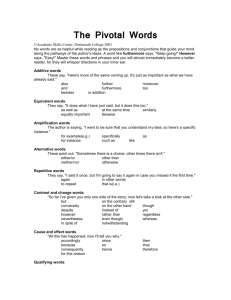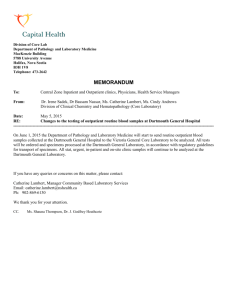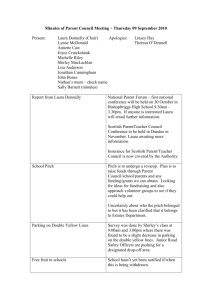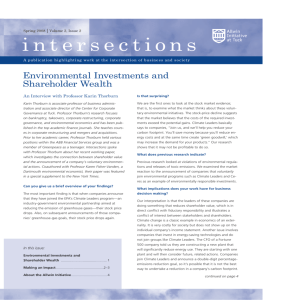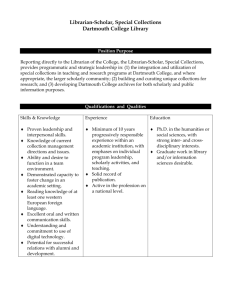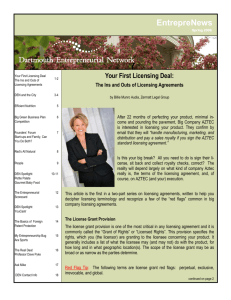EntrepreNews - DEN - Dartmouth College
advertisement
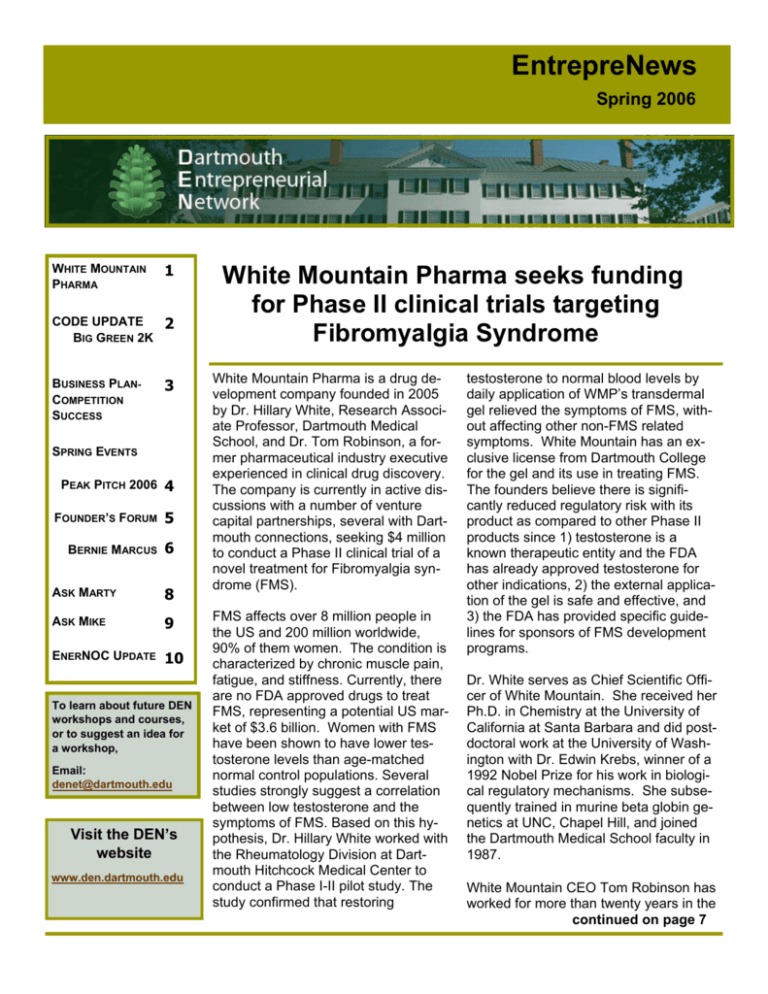
EntrepreNews Spring 2006 WHITE MOUNTAIN PHARMA 1 CODE UPDATE 2 BIG GREEN 2K BUSINESS PLANCOMPETITION SUCCESS 3 SPRING EVENTS PEAK PITCH 2006 4 FOUNDER’S FORUM 5 BERNIE MARCUS 6 ASK MARTY 8 ASK MIKE 9 ENERNOC UPDATE 10 To learn about future DEN workshops and courses, or to suggest an idea for a workshop, Email: denet@dartmouth.edu Visit the DEN’s website www.den.dartmouth.edu White Mountain Pharma seeks funding for Phase II clinical trials targeting Fibromyalgia Syndrome White Mountain Pharma is a drug development company founded in 2005 by Dr. Hillary White, Research Associate Professor, Dartmouth Medical School, and Dr. Tom Robinson, a former pharmaceutical industry executive experienced in clinical drug discovery. The company is currently in active discussions with a number of venture capital partnerships, several with Dartmouth connections, seeking $4 million to conduct a Phase II clinical trial of a novel treatment for Fibromyalgia syndrome (FMS). FMS affects over 8 million people in the US and 200 million worldwide, 90% of them women. The condition is characterized by chronic muscle pain, fatigue, and stiffness. Currently, there are no FDA approved drugs to treat FMS, representing a potential US market of $3.6 billion. Women with FMS have been shown to have lower testosterone levels than age-matched normal control populations. Several studies strongly suggest a correlation between low testosterone and the symptoms of FMS. Based on this hypothesis, Dr. Hillary White worked with the Rheumatology Division at Dartmouth Hitchcock Medical Center to conduct a Phase I-II pilot study. The study confirmed that restoring testosterone to normal blood levels by daily application of WMP’s transdermal gel relieved the symptoms of FMS, without affecting other non-FMS related symptoms. White Mountain has an exclusive license from Dartmouth College for the gel and its use in treating FMS. The founders believe there is significantly reduced regulatory risk with its product as compared to other Phase II products since 1) testosterone is a known therapeutic entity and the FDA has already approved testosterone for other indications, 2) the external application of the gel is safe and effective, and 3) the FDA has provided specific guidelines for sponsors of FMS development programs. Dr. White serves as Chief Scientific Officer of White Mountain. She received her Ph.D. in Chemistry at the University of California at Santa Barbara and did postdoctoral work at the University of Washington with Dr. Edwin Krebs, winner of a 1992 Nobel Prize for his work in biological regulatory mechanisms. She subsequently trained in murine beta globin genetics at UNC, Chapel Hill, and joined the Dartmouth Medical School faculty in 1987. White Mountain CEO Tom Robinson has worked for more than twenty years in the continued on page 7 Page 2 GyroBike Win’s BIG GREEN 2K Entrepreneurship Competition By Karan Danthi ’07 On May 15th, the Club of Dartmouth Entrepreneurs’ year-long Big Green $2K business idea competition came to a successful conclusion as four team finalists delivered their business plan presentations to a standing room only crowd in Carson L01. The presentations were the culmination of a series of seminars, preliminary events, and one-on-one coaching that at times involved up to 25 contestants. The competition was judged by Peter Glenshaw, Director of Corporate & Venture Initiatives at Dartmouth College, Bill Martin ’87, Adjunct Assistant Professor of Business Administration at the Amos Tuck School of Business, Corrie Martin ’90, Senior Programs Manager of Specialized Programs at the Amos Tuck School of Business, and local entrepreneur John Stephens, co-founder of Cayman Systems. The judges commented that the final four presentations were all promising business ideas and of a high caliber demonstrating each team’s ability to originate and market a business idea. The audience played an active role during the event by grilling the teams on different aspects of their business models. After much deliberation, the judges awarded GyroBike Precession Stability Systems L.L.C the contest’s $2000 first prize. GyroBike licenses and manages the intellectual property of a novel means of gyroscopically stabilizing bicycles as an alternative to training wheels. The team is made up of undergraduates Hannah Murnen '06, Nathan Sigworth '07, Deborah Sperling '06, and Augusta Niles '07. According to the judges, the team had the most Olivia Zaleski ‘06 presents at the robust business plan CODE Big Green 2K Business and clearly had inIdea Competition on May 15th vested incredible time and resources in the technology, the plan and the presentation. Olivia Zaleski ’06, founder of “olivia,” won a second place prize of $500; olivia is an athletic–apparel design-company that provides quality, comfortable, fashionable, and flattering sportswear to young and style-conscious women. Other finalists included Bob Blake '06 and Ryan Wheeler '06 of “B&R Housing Solutions, Inc.” and Peter Scheufele '06 and Darnell Nance '06 of “Ara Cleat Guard.” B&R Housing Solutions is a business From left: Nathan Sigworth ’07, idea for the design Hannah Murnen ’06, Augusta Niles and marketing of an ’07, and (on bike) Deborah Sperling inexpensive temporary housing solution based on industrial shipping containers. Ara has developed a guard for athletic cleats that protects cleats and flooring from wear and damage, while also protecting the wearer from slipping on non-grass surfaces. "The competition has helped put us in contact with a number of people in the Dartmouth community who have been integral in the development of our product and company." Peter Scheufele '06 The final presentations were the culmination of the Big Green $2k competition which, according to CODE leaders, accomplished its goal of inspiring and educating undergraduate students to formulate and execute a business plan. The interest generated by the competition is another sign of growing interest in entrepreneurship among Dartmouth students. The hard work of the CODE leadership over the past year has laid a solid foundation for future competitions and other entrepreneurial events focused on undergraduates interested in entrepreneurship. Page 3 Dartmouth Companies Win Big in Spring Business Plan Competitions Advanced Transit Enterprises, Inc. Takes Top Prize at Rice Business Plan Competition On April 1st, Advanced Transit Enterprises, Inc. was awarded the grand prize at the Rice Business Plan Competition in Houston, TX. The winning Tuck team was composed of Errik Anderson T’07, Daniella Reichstetter T’07, Andrew Smith T’07, Keith White T’07, and Mclean Wilson T’07. Founded at the end of 2005 with Andrew Smith T’07 as CEO and Keith White T’07 as COO, Advanced Transit Enterprises seeks to commercialize a patented tractor-trailer rear drag aerodynamics technology that has the potential to reduce fleet vehicle oil consumption by more than 200 million gallons annually. The three-day competition was sponsored by the Rice Alliance for Technology and Entrepreneurship and the Jesse H. Jones Graduate School of Management at Rice University. More than 100 business plans were submitted to the competition. ATE was one of 35 teams from top MBA schools around the world that were chosen as semifinalists. With a grand prize valued at more than $165,000, the competition was meant to simulate a real world scenario. ATE and the other semi-finalists presented their business plans to more than 150 judges with backgrounds in venture capital, early-stage investing, and entrepreneurship. Advanced Transit Enterprises co-founder and CEO Andrew Smith commented, "Our team is passionate about bringing technology to market that reduces the world's dependency on fossil fuels. This passion mixed with sound business logic obviously came through during the business plan competition." The grand prize was valued at over $165,000, including a cash prize sponsored by Shell Technology Ventures and a $100,000 investment from the GOOSE Society of Texas. The GOOSE Society includes six angel investors including the founder of Vanguard Ventures, the former CEO and Founder of Compaq, the current CEO and owner of the Wine Group and the former founder of Paranet. DEN Director and Tuck Professor Gregg Fairbrothers served as an advisor to the company. Tuck’s MBA Program Office and the Center for Private Equity and Entrepreneurship sponsored ATE’s trip to Texas. In addition to winning the Rice Business plan competition, on April 7th ATE took second place in the Global Social Venture competition in which ATE was one of nine finalists from 97 business plans accepted from around the world. ATE is currently in the process of finalizing commercial design and plans to introduce the product to the market in in 2007. Stellaris Corporation Wins $125,000 at the 2006 Ignite Clean Energy Competition On May 9th, Stellaris Corporation won the 2006 Ignite Clean Energy Business Presentation Competition. Started in 2005 by the Energy Special Interest Group (ESIG) of the MIT Enterprise Forum of Cambridge, the Ignite Clean Energy Competition provides training, mentoring, coaching, and $125,000 in prizes and services to clean-energy entrepreneurs. Jim Paull Th’67, President , and Lee Johnson T’05, COO founded Stellaris Corporation in April 2005. The company’s focus is solar and sustainable energy innovation. Tom Ward, T’86, joined the company as VP Marketing this April. The company’s patentpending CPG technology drastically reduces the cost of solar modules and offers a number of design options never before possible with existing solar cells. At the competition Johnson presented the team’s plan to the judges and almost 400 audience members who filled the MIT Stata Center. Stellaris won $15,000 cash, plus $25,000 in office/ incubator space, and $7,500 in legal services. “Winning this competition will greatly increase our visibility with potential investors on both coasts, and for this we are grateful,” said Jim Paull. “It is rewarding when a team of industry experts from energy technology companies, venture capital firms, and academic technology experts confirms that you are on the right track.” This was not the first business competition prize for Stellaris. In February they took second place at University of Colorado’s Sustainable Venturing Business Plan Competition in Boulder, Colorado. Stellaris was one of eight invited teams selected from more than 25 national and international universities who submitted business plans. Stellaris won second place and was awarded a prize of $7,500. WOSPRO Wins Social Venture Awards This Spring Thayer PhD candidate Ashifi Gogo, a co-founder WOSPRO, competed in the University of San Francisco - Pacific Specialty Insurance International Business Plan Competition and the Hong Kong University of Science and Technology International Business Plan Competition. For both competitions WOSPRO walked away with the social venture award and took home a total prize of $1000. WOSPRO addresses the major trends in Europe's expanding organic industry: ethical/sustainable production, eco-conservation, health integrity and extensive information beyond conventional labeling. WOSPRO is developing MUREMDS, the worlds first, web-enabled, client-interface portal, facilitating customer interactivity with the agro-industrial process. MUREMDS seeks to connect consumers directly with small organic farmers from whom they are purchasing organic product. In San Francisco, WOSPRO took home the Claudio Chiuchiarelli Family Foundation Social Enterprise Prize. The $500 prize is awarded to the team whose proposal demonstrates the greatest potential to affect positive social change. In Hong Kong, WOSPRO won the Best Social Venture award. Page 4 Spring Events Successful Run for Peak Pitch '06 By Meagan Pryor, Borealis Ventures On March 30th, entrepreneurs from all over New England enjoyed Peak Pitch '06: Sunday River, the final event in the three-part Peak Pitch series. Peak Pitch is a uniquely Northern New England version of the classic "elevator pitch," but the weather for the final event in Maine was anything but typical New England. With temperatures in the 60's, pitches were not muffled by hats and scarves, the lunch program took place on a sun drenched patio, and the mood was jovial - a fitting end to a successful series. from left: Matt Harris, Village Ventures, Phil Ferneau’84. T’96 , Borealis, John Witherspoon, CEO, Finance Authority of Maine This was the second year for Peak Pitch, which began as a precursor to the Start-Up New Hampshire Business Plan Competition 2005. For 2006 Borealis Ventures decided to continue and also expand the program. To leverage business connections throughout New England, Borealis partnered with local hosts for each event, including FreshTracks Capital for Bolton Valley, VT; the NH Advantage Foundation for Mt. Sunapee, NH; and for Sunday River, a syndicate of Maine sponsors that included the Finance Authority of Maine, the Maine Investment Exchange, the Maine Technology Institute, and the Small Enterprise Growth Fund. “It was a great experience that I highly recommend to any company that is starting to raise money or wants to learn more about the process." Chris Pearson T’03, Founder, Sound Innovations Having three venues gave over 100 entrepreneurs (outfitted in blue ski bibs) the chance to pitch to over 75 investors (in green-of course!). With an informal pitch-off as the only overtly competitive aspect of the day, Peak Pitch is simply a chance for entrepreneurs and investors to network in a fun and informal setting. The feedback on the events has been tremendously positive. “I decided to do all three events, and it was a great experience that I highly recommend to any company that is starting to raise money or wants to learn more about the process," said Chris Pearson, founder of Sound from left : Rick Howell, entrepreneur, Knee Binding, Michael Burgmaier T’01, CEI Community Ventures Innovations, which produces a sound-cancellation technology. Chris was the winner of the Mt. Sunapee Peak Pitch "Pitch-off." "Going through all three Peak Pitches gave a chance to hone my pitch based on the feedback I received. I made some great investor contacts that would have been hard to make otherwise. At the end of one month I have a good, field tested pitch and contacts that I hope to develop. That’s a great return on the time I spent, and you can’t complain when your work entails three days of skiing." Borealis hopes to continue and build-on the success from this year's events by making the Peak Pitch series a winter tradition for the entrepreneurial communities of New England. Reports John Burns, Fund Manager of Maine's Small Enterprise Growth Fund, "It certainly appeared that everyone had a good time and clearly many important connections were made! We have all heard positive feedback from both blue and green bibs since our return. We look forward to next year!" Page 5 Spring Founder’s Forum with Samuel Straface On Tuesday, April 25th, with support from Rockefeller Center’s Portman Fund, the DEN and Tuck’s Center for Private Equity and Entrepreneurship hosted Dr. Samuel Straface for the spring semester’s Founder’s Forum. Students, faculty and staff from Tuck and Dartmouth, as well as visitors from DHMC and DMS filled Stoneman classroom at Tuck for the interactive session as Dr. Straface shared the story of how his spoiled plans to become a NASA astronaut led him to a career in medical technology businesses and eventually to entrepreneurship. Dr. Straface was born in New York City, but at the age of ten moved to Perth, Australia where he spent his childhood dreaming of becoming an astronaut. From age sixteen, a mentor in the armed forces helped him get the background and education it would take to be accepted into the NASA Space Program. He enrolled in all the right classes, performed superbly in school, and did all the right things to prepare to enter Navy flight school including earning his PhD in neurophysiology when his mentor told him a PhD was a must. But after more than ten years of preparation, Dr. Straface found himself with no contingency plan when his dreams to join the Navy’s Flight school and ultimately become an astronaut were dashed because of major cuts to specialist military training programs. At 27 years old and with his bank account balance dwindling, Samuel took a job as a telemarketer while he searched for a Students, faculty, and staff listen to Dr. Samuel job. Telesales, he felt, would give him experience he needed Straface, President and CEO, Triton BioSystems to sell things to people. Little did he guess at the time that the on April 25th at Tuck School of Business experience would get him a job at Johnson & Johnson. Using the last $400 in his bank account he purchased a plane ticket to Sydney, Australia where he had arranged a meeting with an executive at Johnson & Johnson. Impressed by Samuel’s credentials and his reasons for working in telemarketing, the meeting quickly turned into an interview and Samuel left Johnson & Johnson with a job offer. During his career, Samuel served as the General Manager of three divisions of Johnson & Johnson in Australia and also held numerous positions at Ethicon Endo-Surgery. In 1997 he joined Boston Scientific Corporation and eventually became Director of the New Ventures Group. Samuel also co-founded Sensera, Inc., a development stage biological sensor company developing products for the point of care clinical diagnostics market. Throughout his early career his work centered around emerging markets, which prepared him for his entrepreneurial ventures with Sensera, Inc. and his current start-up Triton BioSystems. Triton BioSystems, Inc. (TBS) is a leading nanobiotechnology company developing low side effect, highly selective therapies for advanced cancers. TBS is developing non-invasive targeted therapeutics that use heat to treat cancer. The Company has leveraged its experience with magnetic nano-materials and magnetic field energy to make antibodies tumoricidal and more therapeutically selective, without the side effects of conventional therapies. TBS is developing this anticancer therapy to treat late-stage cancers such as breast, head and neck, lung, colon, ovarian, pancreatic and prostate cancers. The company is in its pre-clinical stage and expects to begin human clinical trials in 2006, possibly at Dartmouth’s Norris Cotton Cancer Center. During the session Samuel shared his struggles, including the lessons he has learned as an entrepreneur. He provided insight into pitching to venture capitalists and working with the FDA. If you are interested in viewing the video of the event please contact Carrie Newton at 603-646-0295. Page 6 Bernie Marcus, Co-Founder, The Home Depot, Visits Dartmouth Campus in April On Friday, April 28th Bernie Marcus, co-founder and former CEO of The Home Depot, spoke to a capacity crowd at Tuck School of Business. Students, faculty, staff and local community members filled Cook auditorium at Tuck for the Portman Fund Inaugural lecture. Marcus’ visit marked the first lecture in a series funded by the Portman Entrepreneurial Leadership Fund established in 2004 by William C. Portman ’45 T’47, Robert J. Portman ’78, William C. Portman III T’81 and Virginia Portman Amis. Bernie Marcus' vision of a "new and improved home center for the do-it-yourselfer," became reality as The Home Depot. The first three stores opened in Atlanta, The Portman family with Bernie Marcus during a private Georgia in 1979, and The Home Depot became a reception at Stell Hall, Tuck School of business modern day success story, revolutionizing the home improvement industry. Much of the Home Depot’s success can be attributed to hands on management from co-founder Bernie Marcus. For many years Bernie personally trained store managers and was a frequent visitor to each store throughout the United States. When Home Depot store number 1300 opened Bernie realized the days of visiting every store and training managers one-on-one had passed, but the values that he instilled in his employees continue to be cultivated. The Home Depot is now the world's largest home improvement chain and the second-largest retailer (after Wal-Mart) in the US. With sales of more than $73 billion, there are more than 2,000 stores in all 50 states, the District of Columbia, Canada, Mexico, and Puerto Rico. Bernie instilled a sense of service in his employees that has been reflected in may ways throughout the From left Jay Belisle, Sales Associate, The Home Depot years including helping with the search and rescue Tilton, NH, Bernie Marcus, and Tammy Belisle , Operations efforts after the Oklahoma City bombing and the SepManager, The Home Depot, Hooksett, NH tember 11th attacks. In each case his managers were empowered to act on their own, without corporate approval, to do what needed to be done to contribute to their communities. Mr. Marcus’ philanthropy extends beyond the walls of Home Depot. In November 2005, he shared in the celebration at the grand opening of Georgia Aquarium in Atlanta. As a gift to the town who gave him such success, Bernie donated funds to build the largest aquarium in the world in Atlanta. The aquarium holds 8 million gallons of fresh and marine water, housing more than100,000 animals, representing more than 500 species from around the world. With support from the Portman Fund, The Rockefeller Center, the DEN and Tuck’s Center for Private Equity and Entrepreneurship organized Bernie’s visit. Page 7 White Mountain Pharma Continued from page 1 pharmaceutical industry, starting at Pfizer where he worked on products such as Procardia, Procardia XL, Norvasc and Feldene. Later in his career, Dr. Robinson joined Sankyo where he focused on FDA programs for three NDA and Phase IV projects which now generate almost $1 billion in annual sales. Based on his experience in the industry, he was impressed with Dr. White’s data and began working with her in the fall of 2005 on what eventually became White Mountain Pharma. During the winter semester of 2006, Dr. White took advantage of the Introductory Entrepreneurship course at Tuck to build her knowledge base on starting a company. “The timing of the course was perfect,” said Hillary. “We saw a unique opportunity to use the resources at Tuck to develop our business. The course covered topics that were very relevant to what we were working on at White Mountain Pharma. When the class covered feasibility analysis, writing a business plan, finance and pitching ideas, we were actually going through these exercises in real time. It meant that Tom and I could have meaningful exchanges back and forth until we felt we really had it right.” The major challenge for WMP has been to advance the project without obtaining up front financing. Dr. White and Dr. Robinson believed that the company would be in a better position for investors after achieving a number of initial goals including developing their business plan, locking in the licensing agreement with Dartmouth College, updating patent strategies, scheduling a preIND (Investigational New Drug) meeting with the FDA, selecting a contract research organization to compile and process past and future data in FDA-optimal format, and initiating the manufacturing of clinical supplies. In addition to these goals, the next clinical study was designed, submitted to the Dartmouth IRB, the Committee for Protection of Human Subjects (CPHS), and was approved. With this kind of progress, they are finding it easier to attract investors. A key resource in seeking funding has been Rob Crary, T’84, founder of Fulcrum Management, a private equity concern in NYC. “Rob’s expertise in private equity investment is critically important to White Mountain during our funding search,” according to Dr. White. Prior to coming to Tuck, Mr. Crary worked at Chemical Bank (JP Morgan Chase), and after receiving his MBA he consulted at Arthur D. Little, Inc. in strategic planning, diversification and acquisitions evaluation. Prior to establishing Fulcrum Management, Mr. Crary was VP and Director of Creditanstalt Capital Corporation. “Because Rob is not only a Tuck graduate, but is also related to the second Dean of the Medical School, his association with WMP as Strategic Advisor allows him to come full circle back to Dartmouth. Tom and I are fortunate to have Rob working with us,” said Hillary. “The next steps for our company revolve around finding the right VC funding partner - a partner who shares our vision for success,“ says Dr. Robinson. “We’re also preparing the IND application to the FDA, doing production planning of drug for clinical supplies, and designing the logistics of the clinical study. Everything is in place to start the study in the fourth quarter. With the results of the study in hand, we will be at an optimum valuation point for additional funding or an exit opportunity.” Ask Marty by Marty Doyle D’76 Page 8 In the course of his 25 year legal career, Marty Doyle D’76 has developed an expertise in the representation of early stage companies in the life sciences, information technology and consumer products fields. At several points during his career, Mr. Doyle has had the opportunity to cross over to the “other side of the table” to establish and manage start up companies. Mr. Doyle has also acted as a director and consultant to numerous companies, primarily in the life sciences sector. In addition to his professional career as a senior manager, consultant and attorney, Mr. Doyle writes and speaks regularly on topics of interest to emerging companies, their founders and investors. Question: I am the CEO of a start up company with a proprietary medical device technology. We see a market potential for our product in excess of $500 million, and estimate that it will take five years and $10 million to bring the first version to market. With a well-capitalized, “name” marketing partner, we might reduce that time by 50%. How do we decide whether to bring in a more established partner and when to do it, or to go it alone? Marty: Your question poses a dilemma that most early stage companies face from the first “proof of principle” to product sale, and beyond. Much of the answer depends on details of the specific situation, but here are some general suggestions that usually apply: Have a solid, well-constructed timeline and development plan with clear milestones, budgets and resource requirements. This allows you to gauge your progress and prognosis at any given time. As you achieve the milestones along your timeline, the value of your product/enterprise should increase exponentially because you’re eliminating technical and commercial risks. This also lets you weigh the costs and hurdles involved in getting through the next milestone, and whether engaging with a strategic partner is a better alternative at any given point than going it alone. Consider the Context. With such an internal analysis in hand, look at external influences such as present and future competition for your product, unmet needs in the market, strength and length of patent protection, etc. For example, if a big player in your target market is working toward the same goal as you, or if another technology is coming on line that could eliminate the need for your product, it’s better to bring in a partner and cash out sooner rather than later. Be Practical. People talk about all sorts of quantitative decision analyses, but I’ve generally found that, for small companies, the decision as to whether to bring in a big partner hinges on three simple things: How much money is left to work with? Is there a viable partner candidate interested? Can you live with how much the partner will pay? The fact is, most large companies – especially public ones – often ignore even promising early stage companies. In general, they prefer to pay more later, rather than divert internal time and resources to developing business lines that may fail, or even if they succeed, might take years to have an impact on the quarterly financials that drive public markets. Small companies often make the mistake of falling too much in love with their own companies, and only become realistic about offers from large partners when it’s too late. If you have a good partner candidate who’s interested in working with you, you’re one of the fortunate few. If you’re in a position to need to partner strategically, within reason it’s generally smart to make the best deal you can and move on to your next project. Page 9 ASK MIKE QUESTION How should we set partnership salaries? "I'm one of three partners who set up a company that has become very profitable. We each put in equal working capital, and we've each taken the same small salary for the past three years. But now my two partners, who mostly handle sales, are lobbying for big raises based on 'market comparables.' That leaves me holding the short end of the stick, because I'm the inside guy who handles operations and finance stuff--which usually isn't as highly paid as sales. What do you think is fair here?" ANSWER As you've no doubt figured out, partnership pay is a subject you should always wrestle with before you go into business with anyone else. Yes, it's an academic question then, but once you're fighting over real money the issues get far more emotional. But even if you're already making money, there are bound to be good years and less-good years, so you need to define an ongoing formula that all three partners accept (perhaps with some grumbling). I'd start by making a distinction between how you split the profits your company earns and how you pay yourselves for your day-to-day work. It's reasonable to peg your individual salaries to market standards, since that's usually a fair measure of the skills and effort a job requires. Then come up with a separate formula for dividing corporate profits. For instance, you could agree to split all profits equally, since you each contributed the same working capital. Or you could devise a formula that puts extra weight on certain high-value contributions. I know one group, for example, that gives two rainmaker partners a 25% bonus share of profits because winning new clients is the lifeblood of their business. Incidentally, I wouldn't take for granted that an “inside" partner automatically gets paid at the bottom end of the totem pole. In businesses with tight margins, a manager who's a whiz at operations often contributes more net profit than any of the sales folk. QUESTION How do investors feel about high-living managers? Mike Gonnerman ’65 is a finance expert and a trusted advisor to technology CEO's and investors. To register to receive Mike's free monthly newsletter by email "Our executive team has set up a please visit his website: very generous benefits plan for http://www.gonnerman.com itself--luxury car leases, openended expense accounts, fancy office furniture, etc. I'm trying to put together a business plan to attract some expansion capital, and I'm worried what investors will party at a ritzy restaurant? think about our high standard of Probably not. living. 'It's a sign of success,' my boss says, but I'm skeptical. Your Investors are particularly opinion?" hostile to lavish spending, because they feel manANSWER agement should have a single objective — to creYou're absolutely right to challenge ate value for the owners extravagant spending. There may of the business. They'll be some advertising value to looking accept a modest level of creature comforts, espesuccessful — for instance, if clients cially if it helps attract talregularly visit your offices — but ented executives. But you most of us can easily spot out-ofcan expect to be chalcontrol spending when we see it. Is there any business benefit to holding lenged on any major expense that doesn't have a a board meeting in Bermuda? For paying first-class airfare for all execu- clear connection to shareholder value. tive travel? For holding a Christmas Page 10 Dartmouth College 1 Rope Ferry Road Rooms 101, 102 Hinman Box 6248 Hanover, NH 03755 Phone: 603-646-0295 Fax: 603-646-0291 Email: denet@Dartmouth.edu Website: http://www.den.dartmouth.edu DEN Staff Gregg Fairbrothers Director, DEN Adjunct Professor of Business Administration, Tuck School of Business gregg.fairbrothers@dartmouth.edu Carrie Newton Program Administrator, DEN carrie.c.newton@dartmouth.edu DEN Fellows Colin Blaydon Director , Tuck’s Center for Private Equity and Entrepreneurship, Dean Emeritus, Tuck School of Business. Philip J. Ferneau '84, TU'96 Adjunct Associate Professor of Business Administration, Tuck School of Business. Managing Director, Borealis Ventures Peter T. Glenshaw Managing Director, Dartmouth Venture Initiatives Mark Israel Director, Norris Cotton Cancer Center Aaron Kaplan Associate Professor of Medicine & Director, Device Development Lab, DHMC Roger Sloboda Professor of Biological Sciences, Dartmouth College Fred Wainwright, TU’02 Executive Director, Tuck’s Center for Private Equity and Entrepreneurship. Adjunct Assistant Professor of Business Administration, Tuck School of Business EnerNOC in the News EnerNOC Named to Entrepreneur and PricewaterhouseCoopers' Hot 100 List of Fastest-Growing New Companies EnerNOC, Inc. has been named to the 12th Annual Hot 100 listing of the fastest-growing new companies in the United States, as compiled by Entrepreneur magazine and PricewaterhouseCoopers. EnerNOC is one of only three companies providing energy related services in this year's Hot 100. Founded in 2001 by Tuck students Tim Healy ’91, T’02 and David Brewster T’02, EnerNOC helps utilities and grid operators achieve clean and low-cost peak electric capacity reduction through demand response solutions and technologies. Demand response is the reduction of electrical consumption at the end-use customer level in response to price or reliability signals. With its industry-leading technology, EnerNOC manages the demand response strategy, program participation, event execution, and data reconciliation for hundreds of commercial, industrial, and institutional clients to provide guaranteed "negawatt" reductions to its utility and grid operator customers. Further, EnerNOC's technology and professional expertise supplies end-use clients with better information to manage their energy use and realize significant cost and energy savings. EnerNOC has increased revenues by over 100% each year since inception and has grown to over 75 employees. Tim Healy, EnerNOC CEO, said, "EnerNOC's success and exceptional revenue growth is attributable to the world-class team that we have assembled, and our unparalleled passion for developing and delivering innovative solutions to address supply and demand issues facing today's energy industry. The challenge of securing cost-effective, clean energy resources continues to drive the need for fresh ideas and innovative thinking in this space. For more information visit http://www.enernoc.com
